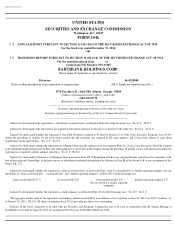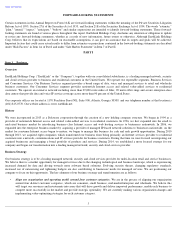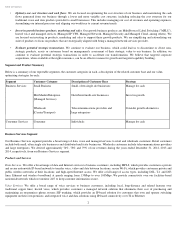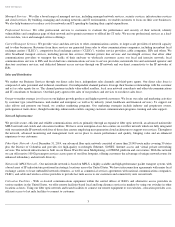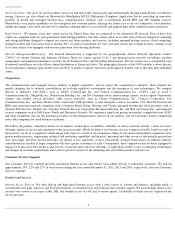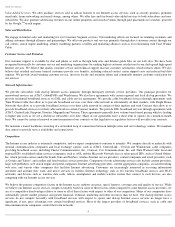Earthlink 2014 Annual Report Download - page 11
Download and view the complete annual report
Please find page 11 of the 2014 Earthlink annual report below. You can navigate through the pages in the report by either clicking on the pages listed below, or by using the keyword search tool below to find specific information within the annual report.
Table of Contents
and offer a wider variety of services than we offer, including voice, data and video services. Their ability to bundle services and to offer
broadband services at prices below the price that we can profitably offer comparable services puts us at a competitive disadvantage. In addition,
our only significant access to offer broadband services over cable is through our agreement with Time Warner Cable.
Regulatory Environment
Our communications services are subject to varying degrees of federal, state and local regulation. Telecommunications services are subject to
particularly extensive regulation at both the federal and state levels. Internet access services, which are not telecommunications services, are
subject to a lesser degree of regulation. Federal, state and local regulations governing our communications services are the subject of ongoing
judicial proceedings, rulemakings and legislative initiatives that could change the manner in which our industry operates and affect our business.
Overview
Through our wholly-
owned subsidiaries, we hold numerous federal and state regulatory licenses to provide communications services. The
Federal Communications Commission (“FCC”)
exercises jurisdiction over, among other things, providers of interstate and international
telecommunications services. The FCC also has authority over some issues related to local competition in the provision of telephone services and
other telecommunications services. State regulatory commissions, commonly referred to as public utility commissions (“PUCs”),
generally
retain jurisdiction over telecommunications carriers to the extent that they provide intrastate communications services. PUCs also have authority
to review and approve interconnection agreements between incumbent telephone carriers and competitive carriers such as us, and to arbitrate
disputes arising in the negotiation of such agreements. Local governments may require us to obtain licenses, permits or franchises to use the
public rights-of-
way necessary to install and operate our network. Our operations are also subject to various consumer, environmental, building,
safety, health and other governmental laws and regulations.
The regulatory environment relating to our business continues to evolve. Bills intended to amend the Communications Act of 1934, as amended
by the Telecommunications Act of 1996 (“Communications Act”),
are introduced in Congress from time to time and their effect on us and the
communications industry cannot always be predicted. In late 2013, the House Commerce Committee announced what is expected to be a multi-
year process to revise the Communications Act. Proposed legislation, if enacted, could have a significant effect on our business, particularly if
the legislation impairs our ability to interconnect with incumbent carrier networks, lease portions of other carriers' networks or resell their
services at reasonable prices, or lease elements of incumbent carrier networks under acceptable rates, terms and conditions. We cannot predict
the outcome of any ongoing legislative initiatives or administrative or judicial proceedings or their potential impact upon the communications
and information technology industries generally or upon us specifically.
Federal Regulation
Our operating subsidiaries that provide telecommunications services subject to FCC authorizations are classified as non-
dominant
telecommunications carriers by the FCC and, as a result, the prices, terms and conditions of our interstate and international telecommunications
services are subject to relatively limited FCC regulation. Like all common carriers, we are subject to the general requirement that our charges,
practices and classifications for telecommunications services be “just and reasonable,” and that we refrain from engaging in any “
unjust or
unreasonable discrimination”
with respect to our charges, practices or classifications. The FCC must grant its approval before any change in
control of any carrier providing interstate or international communications services, or of any entity controlling such a carrier, and before the
assignment of any authorizations held by such a carrier. We have the operating authority required by the FCC to conduct our interstate and
international telecommunications business as it is currently conducted. As a non-
dominant carrier, we may install and operate additional
facilities for the transmission of domestic interstate communications without prior FCC authorization, except to the extent that radio licenses are
required. We currently do not hold any radio licenses. The following discussion summarizes some specific areas of federal regulation that
directly or indirectly affect our business.
Local Competition.
The Communications Act preempts state and local laws to the extent that they prevent competition in the provisioning of any
telecommunications service. It also imposes a variety of duties on carriers providing local telephone services, including competitive carriers such
as us, to promote competition in the provisioning of these services. These duties include requirements for all local carriers to:
6
•
interconnect with other telecommunications carriers;


